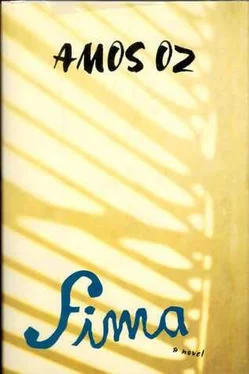And he muttered:
"But that's not fair."
And then, self-mockingly:
"So, why not sign a petition?"
His tired hand was doodling on the paper in front of him, drawing circles and triangles, crosses, six-pointed stars, missiles, and big breasts. Among these doodles he unconsciously inscribed the line that had come into his head earlier: "Cranes wheel and whirl." Underneath he wrote: "Wains heel and curl." Then he crossed it all out. Crumpling the page into a ball, he tossed it at the wastepaper basket. And missed.
Then he thought of making use of the spare time by composing two letters, one an open letter, a reply to Günter Grass about guilt and responsibility, and one private, a belated reply to Yael's farewell letter of twenty-four years ago. It was particularly important for him to explain to Yael and to himself why he had been so rude to the two air force colonels who had come to their home that Saturday evening specially to convince him that Yael's going to work in Seattle or Pasadena for a year or two was of national importance. He still remained unshaken in his conviction that the words "national interest" generally served as a cover for all sorts of monstrosities. But now, half a lifetime later, he no longer saw himself as entitled to preach. By what right? What have you accomplished with your life? Will it be of any use to Yoezer and his friends, living here a hundred years from now, that once in Jerusalem there lived a troublesome layabout who got on everybody's nerves with his petty linguistic corrections? Who fornicated with married women? Who reviled and insulted Cabinet ministers? Who argued with lizards and cockroaches? While even vile men like Gad Eitan healed sick women and opened barren wombs?
When the phone rang, instead of his usual greeting, "Clinic, good evening," there slipped out of his mouth the words "Clinic, good dreaming." He immediately apologized, stammered, tried to cover up his slip with a feeble joke, made a mess of it, corrected himself, tried to explain the correction, and booked an urgent appointment for Rachel Pinto for the following week when she had asked for only a routine checkup.
Who knew? Maybe her husband had also left her. Or found a younger mistress. Or been killed on reserve duty in the Territories, and she had no one to comfort her.
25. FINGERS THAT WERE NO FINGERS
AT SEVEN O'CLOCK THEY DREW THE BLINDS AND LOCKED THE CLINIC. The rain and the wind had stopped. A clear, glassy cold had descended on Jerusalem. The stars glowed with a sharp wintry radiance. And from the east, Christian bells tolled loudly and forlornly, as though the Crucifixion were happening at Golgotha that very moment.
Dr. Wahrhaftig went home in a taxi, taking Tamar with him, since he had offered as usual to drop her off opposite the Rehavia high school. Eitan sneaked through the darkness to the side street where he had parked his sports car. While Fima, in his heavy overcoat, with the collar turned up, with his battered, greasy cloth cap on his head, stood for ten minutes or so at the deserted bus stop waiting for a miracle. He had an urge to go to Tsvi and Shula Kropotkin's flat just down the Gaza Road, accept the Napoleon brandy Tsvi had promised him, put his feet up near the radiator, and expound his theory about the rift between Jews and Christians being all the deeper because it was, so to speak, in the family. Our quarrel with Islam, by contrast, is merely an ephemeral dispute over land, which will be forgotten within thirty or forty years. But the Christians in a thousand years' time will still see us as deicides and as an accursed elder brother. This last phrase pierced his heart all of a sudden, reminding him of the baby his mother had borne half a century ago, when he was four. The baby died after only three weeks, of some congenital defect which Fima knew nothing about: it was never discussed in his presence. He had no memory of the baby or of the mourning, but he had a vivid mental picture of a tiny light-blue knit bonnet laid out on his mother's little bedside table. When his father threw out all his wife's belongings at her death, the blue knit bonnet vanished too. Had Baruch given it to the leper hospital in Talbiyeh along with all her clothes?
Fima despaired of the bus and started walking toward Rehavia. Vainly he tried to remember whether he had promised Nina to pick her up from her office after work and take her to see the Jean Gabin film, or whether they had arranged to meet at the cinema. Or was it Annette Tadmor that he had arranged to see? Was it possible that in a fit of absent-mindedness he had asked them both out? He could not find a telephone token in any of his pockets, so he went on walking the empty streets, which were lit occasionally by a yellow streetlight swathed in flickering mist. He walked, oblivious to the biting cold, and thought about his mother, who had also been fond of the cold and loathed the summer. And he wondered what his good friend Uri Gefen was doing at this moment in Rome. Uri was probably sitting in a crowded café in some piazza surrounded by witty men and pretty, provocative women, roaring in his peasant voice and fascinating his audience with stories of air battles in which he had taken pan, or amorous adventures in the Far East, letting fall as usual some wry generalization about the capriciousness of desire, describing in well-chosen words the inevitable shadow of ridicule that accompanies every action and inevitably conceals one's true motives, and concluding with some indulgent commonplace that would finally spread a sort of veil of conciliatory irony over his whole story, the loves, lies, and generalizations he had enunciated before.
Fima ached to feel the touch of Uri's broad, gnarled hand on the back of his neck. He longed for his parodies, his smell, his thick breath, and his warm laughter. At the same time and without any contradiction, he was sorry that his friend was returning from abroad in a couple of days. He was ashamed of his affair with Nina, even though he suspected that Uri had known for a long time about this sexual welfare work and might even have suggested it himself, out of benevolence and affection for the two of them, Fima and Nina, and perhaps also with a sense of detached amusement or regal irony. Was it possible that he asked for and received from Nina a detailed report after each session? Did they sit and rerun the film in slow motion, chuckling together indulgently? A couple of nights ago he had let Nina down, on the rug at her home, and this morning, thanks to Annette, he had let her down again in his own bed. His heart shrank as he remembered how she had stroked his forehead with her wonderfully shaped fingers and whispered to him that like this, with his limp cock, he was penetrating her more deeply than during intercourse. How rare, almost mystical, those words seemed now; they seemed to glow with a precious radiance as he recalled them, and he craved to mend what he had spoiled, to give her and Annette and also Tamar and Yael and every woman in the world, including the plain and unwanted ones, a proper carnal love, and a fatherly and brotherly love, and a spiritual love too.
From a dark garden an unseen dog barked furiously. Fima, startled, replied:
"What's wrong? What have I done?"
And then he added indignantly:
"I'm sorry: I don't believe we've met."
He imagined the domestic winter life behind these façades, behind shutters, windows, and curtains. A man is sitting cosily in his armchair, in his slippers, reading a book about the history of dams. There is a small glass of brandy on the arm of his chair. His wife comes out of the shower with wet hair, pink and fragrant, wrapped in a blue flannel dressing gown. On the rug a small child is silently playing dominoes. A delicate flower of flame blossoms in the grate. Soon they will have their supper in front of the television, watching a family comedy. After that they will put the child to bed with a story and a good-night kiss, then sit side by side on the living-room couch, with their stocking feet propped up on the coffee table, whispering to each other and gradually settling into silence, perhaps holding hands. The moan of an ambulance will sound outside, then only thunder and wind. The man will get up to make sure the kitchen window is fastened properly. He will return carrying a tray with two glasses of lemon tea and a plate of peeled oranges. A small wall light will cast a reddish-brown domestic glow on the two of them.
Читать дальше












